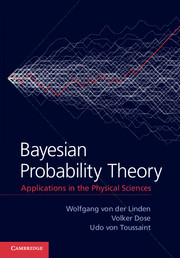Book contents
- Frontmatter
- Contents
- Preface
- PART I INTRODUCTION
- PART II ASSIGNING PROBABILITIES
- PART III PARAMETER ESTIMATION
- PART IV TESTING HYPOTHESES
- PART V REAL-WORLD APPLICATIONS
- PART VI PROBABILISTIC NUMERICAL TECHNIQUES
- Appendix A Mathematical compendium
- Appendix B Selected proofs and derivations
- Appendix C Symbols and notation
- References
- Index
Preface
Published online by Cambridge University Press: 05 July 2014
- Frontmatter
- Contents
- Preface
- PART I INTRODUCTION
- PART II ASSIGNING PROBABILITIES
- PART III PARAMETER ESTIMATION
- PART IV TESTING HYPOTHESES
- PART V REAL-WORLD APPLICATIONS
- PART VI PROBABILISTIC NUMERICAL TECHNIQUES
- Appendix A Mathematical compendium
- Appendix B Selected proofs and derivations
- Appendix C Symbols and notation
- References
- Index
Summary
The present book is comprehensive and application-oriented, written by physicists with the emphasis on physics-related topics. However, the general concepts, ideas and numerical techniques presented here are not restricted to physics but are equally applicable to all natural sciences, as well as to engineering.
Physics is a fairly expansive discipline in the natural sciences, both financially and intellectually. Considerable efforts and financial means go into the planning, design and operation of modern physics experiments. Disappointingly less attention is usually paid to the analysis of the collected data, which hardly ever goes beyond the 200-year-old method of least squares. A possible reason for this imbalance of efforts lies in the problems which physicists encounter with traditional frequentist statistics. The great statistician G. E. Box hit this point already in 1962: ‘I believe, for instance that it would be very difficult to persuade an intelligent physicist that current statistical practise was sensible, but there would be much less difficulty with an approach via likelihood and Bayes' theorem.’ This citation describes fairly precisely the adventure we have experienced with growing enthusiasm during the last 20 years. Bayesian reasoning is nothing but common physicists' logic, however, expressed in a rigorous and consistent mathematical form. Data analysis without a proper background in probability theory and statistics is like performing an experiment without knowing what the electronic devices are good for and how they are used properly.
- Type
- Chapter
- Information
- Bayesian Probability TheoryApplications in the Physical Sciences, pp. xi - xivPublisher: Cambridge University PressPrint publication year: 2014



